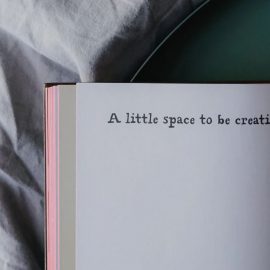

This article is an excerpt from the Shortform book guide to "Wanting" by Luke Burgis. Shortform has the world's best summaries and analyses of books you should be reading.
Like this article? Sign up for a free trial here.
Want to know how to figure out what you want in life? What is the most important question to ask yourself?
Luke Burgis wrote his book Wanting to teach readers his strategies for living a more meaningful life by taking control of what we want. To figure out what you want in life, Burgis suggests you learn how to distinguish meaningful desires from “mimetic desires.”
Read on for Burgis’s advice on identifying your real desires and truly figuring out what you want in life.
Figuring Out What You Want in Life
We spend a lot of time planning how to achieve the things we want in life, such as professional and relationship goals—but we rarely consider why we want those things. In Wanting, Luke Burgis aims to fill this gap by exploring the theory of “mimetic desire,” which argues that we don’t form our own desires—rather, we imitate what other people want or have. If you want to know how to figure out what you want in life, Burgis argues, you must first ask yourself what matters most by identifying which of your existing desires are most meaningful.
In this article, we’ll explore two of Burgis’s strategies for accomplishing this.
(Shortform note: Throughout history, many influential scholars have shared Burgis’s viewpoint that awareness about how the world works empowers you to figure out what you want in life and improve society. For instance, educator Paolo Freire, well-known for his book Pedagogy of the Oppressed, elaborates that awareness empowers you to resist societal oppression, specifically. Friere argues that when people who face oppression (such as people in poverty) learn about the nature of their oppression, they are well-equipped with the knowledge to collaborate with others on resisting that oppression through collective action and organizing.)
Engage in Deep, Silent Introspection
Burgis claims that moments of deep, silent introspection are a powerful tool to help you figure out what you want in life because they surface your meaningful desires. You can learn about yourself—especially your deepest desires—by spending time alone, away from the influence of your models.
According to Burgis, one way to engage in this type of introspection is to go on a multiday, silent retreat. Refrain from talking and screen time to ensure you stay focused on observing your thoughts, sensations, and desires. Over several days, your meaningful desires will surface, such as the desire to connect to your roots by spending time in your ancestors’ homeland.
| Incorporate Radical Acceptance Into Your Deep, Silent Introspection Burgis claims that deep, silent introspection can help you to figure out what you want in life—but what if this type of reflection also surfaces your misleading desires? In Radical Acceptance, meditation teacher Tara Brach provides reassurance that this wouldn’t be a bad thing. She offers a technique for noticing misleading desires during moments of introspection and exploring them to uncover the meaningful desires beneath them. Brach’s technique, which she calls “radical acceptance,” is a meditative practice in which you observe, accept, and learn from the desires that arise. Try practicing it when you’re engaging in deep, silent introspection and a misleading desire arises. Brach offers the following steps for practicing radical acceptance: 1) Notice the feelings and physical sensations that arise as you experience the misleading desire. For instance, say that you have a strong desire for others to praise you for a recent accomplishment. You notice that this desire manifests as an effervescence in your chest (evidence of your eagerness for praise) as well as a sinking feeling in your stomach (evidence of your fear that others won’t praise you). 2) Accept your desire. Do this by reminding yourself that the desire isn’t your fault—for instance, you might desire praise as an adult because you didn’t get enough of it as a child and you still hunger for it. Brach claims that accepting and refraining from assigning yourself blame for your desire keeps you from dwelling on it and helps you move on to the next step. 3) Uncover the meaningful desire beneath the misleading one. Ask yourself: What is the deeper, simpler, more meaningful desire behind this misleading craving? For instance, you might realize that your desire for praise doesn’t come from your desire to be the best, as you originally thought—rather, it comes from the meaningful desire to be loved. When you crave praise, what you really crave is for someone to say they love you. Recognizing this may prompt you to chase this more meaningful desire by deepening your relationships with others and specifying what type of love you need. |
Use the “Meaningful Desire Test”
Furthermore, Burgis identifies three traits of meaningful desires that distinguish them from misleading ones. We’ve organized these traits into three questions. To help you to figure out what you want in life, you should ask yourself each of the below questions. The more times you answer “yes,” to these questions, the more meaningful that desire is.
1) Will pursuing the desire improve others’ lives? According to Burgis, meaningful desires tend to improve not only your life but also the lives of others. For instance, you may find that your desire to make a six-figure salary in a demanding job is less meaningful than your desire to make a five-figure salary in a less-demanding job because the latter option leaves you with time outside of work to volunteer at a shelter.
2) Will pursuing the desire produce long-term satisfaction? For example, your desire to eat at restaurants often may provide you with short bursts of satisfaction. In contrast, your desire to enroll in a cooking class may be more meaningful: It can provide you with the long-term satisfaction of cooking great food for others for the rest of your life.
3) When you’re on your deathbed, will you be glad you pursued the desire? According to Burgis, people close to dying often regret prioritizing misleading desires.
| Additional Criteria for Figuring Out What You Want in Life Burgis’s three traits of meaningful desires may help you to figure out what you want in life, but you may also need to consider additional criteria. Let’s return to each of the questions in this “meaningful desire test” to explore why you may need to consider additional criteria, as well as how to do so. Will pursuing the desire improve others’ lives? As we mentioned earlier, what you believe will improve others’ lives may not necessarily align with what others believe will improve their lives. Therefore, before jumping to conclusions about whether your desire will improve others’ lives, do some research about others’ needs and desires. Consider involving the people you want to support in determining how you should support them. This could lead to what experts call community-centric fundraising—when those in need determine how they use donors’ money instead of donors making that decision for them. Experts in nonprofit work claim that community-centric fundraising is one of the best ways to meet others’ needs. Will pursuing the desire produce long-term satisfaction? Burgis doesn’t specify what counts as long-term satisfaction—a month? A year? A lifetime? To get around this ambiguity, try asking yourself this question more than once. After you’ve determined that a desire is meaningful and worth pursuing, continue to ask yourself this question throughout your pursuit of that desire, such as a month and a year into that pursuit. This will provide you with a chance to assess whether the desire has been satisfying so far, which can provide you with evidence for whether it will continue to be satisfying if you keep chasing it. When you’re on your deathbed, will you be glad you pursued the desire? You may find it hard to imagine what you’ll think when you’re on your deathbed, especially if that seems far away. Therefore, consider modifying this question to make it more relevant in the near future. Business writer Suzy Welch’s “10/10/10 test” may fill this gap: Welch claims that you should imagine what your decision’s consequences will be 10 minutes, 10 months, and 10 years from now. Tweak this exercise to make it relevant to desires by asking yourself, “Will this desire feel meaningful for me 10 minutes from now? 10 months from now? 10 years from now?” If you answer “yes,” to all three questions, the desire is likely a meaningful one. |
Exercise: Further Explore Your Desires in Life
Now that we’ve explored how to figure out what you want in life based on Burgis’s strategies, put your understanding of meaningful desires over misleading ones to the test:
- First, make a list of at least five strong desires you have, whether they’re meaningful or misleading. (For example: owning a larger home, having a child, building stronger relationships with colleagues, getting a promotion, and learning about your heritage.)
- Run each of the desires you listed through the “meaningful desire test.” For each desire, ask yourself the following questions: 1) Does it improve others’ lives? 2) Will it produce long-term satisfaction? 3) When you’re on your deathbed, will you be glad you pursued this desire? Then, choose at least one of the desires that you deemed meaningful and share your answers to those three questions here.
- Describe a misleading desire you have that might interfere with your pursuit of that meaningful desire. (For example, the misleading desire of impressing your superiors and winning the “employee of the year” award might get in the way of your meaningful desire to build stronger relationships with your colleagues.)
- Finally, make a plan for how you’ll resist that misleading desire so you can focus on pursuing more meaningful desires. (For example, you could set boundaries with a colleague who models that misleading desire.)

———End of Preview———
Like what you just read? Read the rest of the world's best book summary and analysis of Luke Burgis's "Wanting" at Shortform.
Here's what you'll find in our full Wanting summary:
- Why we want the things that we want
- How our desires are influenced by what other people want or have
- Strategies for living a more meaningful life by taking control of what we want






